|
De Duitse schrijver Peter Weiss werd geboren op 8 november 1916 in Nowawes (het tegenwoordige Neubabelsberg) bij Berlijn. Zie ook mijn blog van 8 november 2006 en ook mijn blog van 8 november 2008 en ook mijn blog van 8 november 2010.
Uit: Die Ästhetik des Widerstands
Der Frau mit den umschatteten Augen, rechts vorn, war anzusehn, dass sie in einem Kellerloch zu Hause war, dass ihre Kinder hungerten. Der Maler hatte ihre Dürftigkeit gekennzeichnet, er hatte die Arbeitshetze wiedergegeben, die unwürdigen Verhältnisse, unter denen die Arbeitenden sich wuschen und ihre Mahlzeit einnahmen, und doch weckte das Bild keine Empörung. Vielmehr gemahnte es an etwas Unabwendbares. Der arbeitende Mensch war Träger der Aktion, voller Sicherheit verrichtete er
seine Aufgaben, jeder Griff, jede Geste schien ihm selbstbewusste Größe zu verleihn, seine Leistungskraft aber, darauf wies mein Vater hin, war nur dazu angetan, unsichtbare Kassen und Tresore zu füllen. Bei allem Mitgefühl, das der Künstler für die soziale Lage der Arbeiter gespürt haben mochte, waren die Männer, mit ihren zerfurchten Gesichtern und den vor der Glut zusammengekniffnen Augen, ihren um die Werkzeuge geballten Fäusten, doch losgelöst worden
von den gesellschaftlichen Kenntnissen, Dokumentationen und Organisationen, die damals bereits Wirklichkeit besaßen. Als Laufjunge dienend bei Alfa Laval sah ich, wen Menzels Meisterschaft vors bewundernde Publikum gestellt hatte, den deutschen Arbeitsmann aus Bismarcks und Wilhelms Reich, unangefochten vom Kommunistischen Manifest, in seiner einzigen Befugnis, wacker und treu zu sein. Seine mit Glanzlichtern und fließenden Schatten versehne Gestalten waren Handlanger des Eisens. Diesem war etwas Elementares zu eigen. Mit seiner intensiven Glut war es mehr als Metall, es symbolisierte die Expansion des industriellen Imperialismus. Der Arbeiter war grade so viel wert, wie der Lohn, den er empfing. Hauptfigur des Werks, dessen Materialtreue die Freude des Fachmanns war, war nicht der Arbeitende, sondern die weißglühende sinterspritzende Luppe, die zur Akkumulation des Kapitals unter die Walztrommeln kam. Vielleicht hätte mich diese Lesart des Bilds noch nicht überzeugt, wenn ich das Gemälde im Museum nicht flankiert gesehn hätte von zwei andern Werken des Malers.
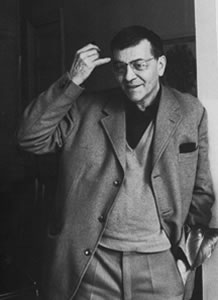
Peter Weiss (8 november 1916 - 10 mei 1982)
De Amerikaanse schrijfster en oorlogscorrespondente Martha Ellis Gellhorn werd geboren in St. Louis, Missouri op 8 november 1908. Zie ook mijn blog van 8 november 2008 en ook mijn blog van 8 november 2010.
Uit: Is There a New Germany?
These boys and girls were in their twenties; they had known no other form of government than "democracy." They had also grown up in an affluent society, though few of them were rich, but none was miserably poor as were the European students of my youth. I liked some of them very much, and thought some almost as detestable as their fathers had been in their brand-new brown uniforms in the pre-war universities.
In my opinion there is no New Germany, only another Germany. Germany needs a revolution which it has not had and shows no signs of having; not a bloody, old-fashioned revolution, with firing squads and prisons, ending in one more dictatorship, but an interior revolution of the mind, the conscience. Obedience is a German sin. Possibly the greatest German sin. Cruelty and bullying are the reverse side of this disciplined obedience. And Germans have been taught obedience systematically, as if it were the highest virtue, for as long as they have been taught anything. They are still so taught, beginning at Mom's knee and continuing through the universities. Twice their victors have imposed "democracy" on a people who never fought for it themselves. Democracy may not be the most perfect form of government (E. M. Forster was right in saying "Two Cheers for Democracy"), but it is the best we have yet found, because it implies that the citizen has private duties of conscience, judgment, and action. The citizen who says Yes to the state, no matter what, is a traitor to his country; but citizens have to learn how to say No and why to say No. Germans are still trained as before in their old authoritarian way; the young are not rebels either. At their best they are deeply troubled by their state and suspicious of it; at their worst they are indistinguishable from their ancestors -- the interests of the state come first -- and they are potentially dangerous sheep.
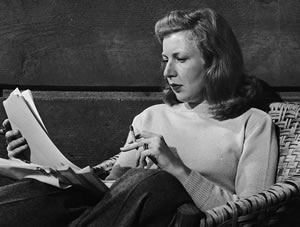
Martha Ellis Gellhorn (8 november 1908 - 16 februari 1998)
De Ameikaanse schrijfster Margaret Mitchell werd geboren op 8 november 1900 in Atlanta, Georgia. Zie ook mijn blog van 8 november 2006 en ook mijn blog van 8 november 2008 en ook mijn blog van 8 november 2010.
Uit: Gone with the wind
Now, what about the corn and the cotton, Pork?
De cawn? Lawd, Miss Scarlett, dey pasture dey hawses in de cawn an cahied off whut de hawses din eat or spile. An dey driv dey cannons an waggins cross de cotton till it plum ruint, cept a few acres over on de creek bottom dat dey din notice. But dat cotton ain wuth foolin wid, cause ain but bout three bales over dar.
Three bales. Scarlett thought of the scores of bales Tara usually yielded and her head hurt worse. Three bales. That was little more than the shiftless Slatterys raised. To make matters worse, there was the question of taxes. The Confederate government took cotton for taxes in lieu of money, but three bales wouldnt even cover the taxes. Little did it matter though, to her or the Confederacy, now that all the field hands had run away and there was no one to pick the cotton.
Well, I wont think of that either, she told herself. Taxes arent a womans job anyway. Pa ought to look after such things, but Pa I wont think of Pa now. The Confederacy can whistle for its taxes. What we need now is something to eat.
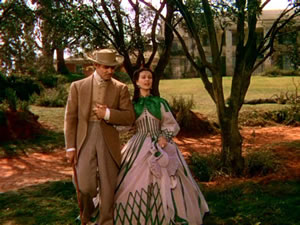
Scene uit de film 'Gone with the wind' uit 1939
Pork, have any of you been to Twelve Oaks or the MacIntosh place to see if theres anything left in the gardens there?
No, Mam! Us ain lef Tara. De Yankees mout git us.
Ill send Dilcey over to MacIntosh. Perhaps shell find something there. And Ill go to Twelve Oaks.
Who wid, chile?
By myself. Mammy must stay with the girls and Mr. Gerald cant
Pork set up an outcry which she found infuriating. There might be Yankees or mean niggers at Twelve Oaks. She mustnt go alone.
That will be enough, Pork. Tell Dilcey to start immediately. And you and Prissy go bring in the sow and her litter, she said briefly, turning on her heel.
Mammys old sunbonnet, faded but clean, hung on its peg on the back porch and Scarlett put it on her head, remembering, as from another world, the bonnet with the curling green plume which Rhett had brought her from Paris. She picked up a large split-oak basket and started down the back stairs, each step jouncing her head until her spine seemed to be trying to crash through the top of her skull.
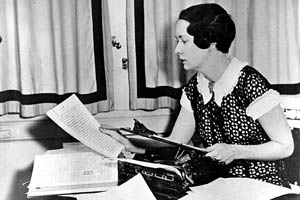
Margaret Mitchell (8 november 1900 16 augustus 1949)
De Ierse schrijver Bram Stoker werd geboren op 8 november 1847 in Clontarf, een wijk van Dublin in Ierland. Zie ook mijn blog van 8 november 2006 en ook mijn blog van 8 november 2008 en ook mijn blog van 8 november 2010.
Uit: Dracula
At every station there were groups of people, sometimes crowds, and in all sorts of attire. Some of them were just like the peasants at home or those I saw coming through France and Germany, with short jackets, and round hats, and home-made trousers; but others were very picturesque.
The women looked pretty, except when you got near them, but they were very clumsy about the waist. They had all full white sleeves of some kind or other, and most of them had big belts with a lot of strips of something fluttering from them like the dresses in a ballet, but of course there were petticoats under them.
The strangest figures we saw were the Slovaks, who were more barbarian than the rest, with their big cow-boy hats, great baggy dirty-white trousers, white linen shirts, and enormous heavy leather belts, nearly a foot wide, all studded over with brass nails. They wore high boots, with their trousers tucked into them, and had long black hair and heavy black moustaches. They are very picturesque, but do not look prepossessing.
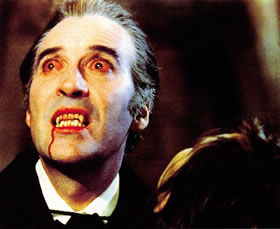
Christopher Lee als Dracula in de film uit 1958
On the stage they would be set down at once as some old Oriental band of brigands. They are, however, I am told, very harmless and rather wanting in natural self-assertion.
It was on the dark side of twilight when we got to Bistritz, which is a very interesting old place. Being practically on the frontier--for the Borgo Pass leads from it into Bukovina-- it has had a very stormy existence, and it certainly shows marks of it. Fifty years ago a series of great fires took place, which made terrible havoc on five separate occasions. At the very beginning of the seventeenth century it underwent a siege of three weeks and lost 13,000 people, the casualties of war proper being assisted by famine and disease.
Count Dracula had directed me to go to the Golden Krone Hotel, which I found, to my great delight, to be thoroughly old-fashioned, for of course I wanted to see all I could of the ways of the country.
I was evidently expected, for when I got near the door I faced a cheery-looking elderly woman in the usual peasant dress-- white undergarment with a long double apron, front, and back, of coloured stuff fitting almost too tight for modesty. When I came close she bowed and said, "The Herr Englishman?"
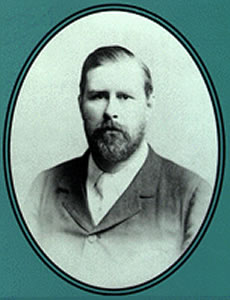
Bram Stoker (8 november 1847 20 april 1912)
Onafhankelijk van geboortedata:
De Zweedse schrijver Carl-Henning Wijkmark werd geboren in 1934 in Stockholm Hij studeerde filosofie in Lund en München en werkte als vertaler en als docent aan de universiteit van Stockholm en als cultureel journalist. Hij vertaalde o.a. Benjamin, Nietzsche en Lautreamont. Sinds 1970 werkt hij alleen als schrijver en heeft hij met zijn romans een belangrijke plaats veroverd in de Zweedse literatuur. Zijn debuut, 'De jagers op Karinhall' (1972), ging over het privéleven van Herman Göring, 'Laatste dagen' over de aanslag op president De Gaulle begin jaren zestig, en 'Da Capo' over het neerhalen van het IJzeren Gordijn.
Uit: Nahende Nacht (Vertaald door Paul Berf)
In regelmäßigen Abständen gaben Birgit oder Angela mir eine Spritze, die mich schläfrig machte, solange ich wach lag, und hellwach in den Träumen, die sich einstellten, sobald ich einschlief. Doch schlief ich wirklich? Es war eher eine Art Dämmerzustand und die Träume waren unkontrollierte Fantasien, sehr deutlich und bevölkert von einem oder mehreren Menschen, die sich bewegten und sprachen. In meinen Träumen sind häufig Repliken vorgekommen, aber früher war es so, dass ich sie eher dachte als hörte; nun erklangen sie dagegen laut und deutlich, allerdings mit einem Hallen wie in einem Kellergewölbe, das individuelle Unterschiede auslöschte. Es war, als hörte man Roboter, was jedoch nicht verhinderte, dass die Menschen aus meiner Vergangenheit, die in diesen Träumen auftraten, realer wurden als jene, die mich in der Gegenwart umgaben. So war es zumindest zu Anfang meines Aufenthalts in Zimmer 5; es sollte sich im Laufe der Zeit ändern.
Der große Segen der Spritze bestand natürlich darin, dass sie die Schmerzen kappte und längere Zeit völlig verschwinden ließ, und ich, der ich im Laufe eines Lebens in der Welt des Theater mehr als genug von Drogentratsch und Fixerhelden mitbekommen hatte, war jetzt ein dankbarer Morphinist. Dennoch möchte ich ausdrücklich meine neue Traumwelt erwähnen, weil sie zum positivsten gehörte, was ich in dieser späten Phase meines Lebens erfahren durfte, auch wenn sie mich nicht selten mit durchaus unangenehmen Szenen und drängenden Fragen konfrontierte. Zwar entwickelte ich mit der Zeit ein immer freundschaftlicheres Verhältnis zu meinen beiden Zimmergenossen und ein immer innigeres zu den Krankenschwestern, die ich bereits erwähnt habe, aber die Träume waren eine sicherere Zuflucht. Und weil ich eine Zuflucht so verzweifelt benötigte, wurden sie, wie gesagt, wirklicher als meine eigentliche Wirklichkeit.
Denn es ließ sich nicht leugnen, dass sich meine Kameraden und ich in einer deathrow befanden - oder dem "Basislager", wie wir es nannten, weil uns das große Wagnis noch bevorstand. Ziel der Pflege an diesem Ort ist es, zu helfen und zu lindern, nicht zu heilen, und es gibt hier auch niemanden, der behaupten würde, einer von uns Patienten könne gerettet werden. Bekommen haben wir die Freundlichkeit und Fürsorglichkeit einiger Krankenschwestern in Form von schmerzlindernden Mitteln und hygienischer Assistenz, ansonsten jedoch nicht viel, was uns das Leben in dieser letzten Zeit erleichtert hätte. Das Essen schmeckte nach nichts, erinnerte an Plastik und wurde zu unserer Erleichterung durch den Tropf ersetzt, als die Verschlechterung unseres Zustands dies erforderlich machte.
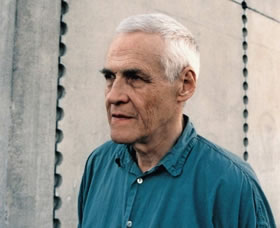
Carl-Henning Wijkmark (Stockholm, 1934)
08-11-2011 om 19:14
geschreven door Romenu 
Tags:Peter Weiss, Martha Gellhorn, Margaret Mitchell, Bram Stoker, Carl-Henning Wijkmark, Romenu
|

